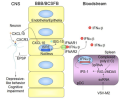I have mentioned elsewhere that I describe PEM as being like having the flu, or another significant infection. I think there are studies that show that cognition is negatively affected during an acute infection, and I don't think it is just the distraction of pain. And I think there are studies that are beginning to throw some light on why that is, I guess how 'sickness behaviour' is generated.
I'm wondering if the cognitive effects of an acute infection are the same as those we experience in PEM, and if the biology driving those cognitive impairments and sickness behaviour in general can help us understand what is happening in ME/CFS.
I'm wondering if the cognitive effects of an acute infection are the same as those we experience in PEM, and if the biology driving those cognitive impairments and sickness behaviour in general can help us understand what is happening in ME/CFS.

